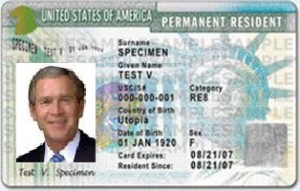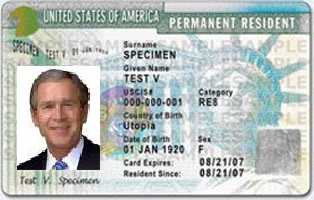 WASHINGTON: At least six influential US lawmakers have supported the move of a group of highly-skilled Indians to remove the per country limit on the allotment of green cards, arguing that the current system was unjust to America, where 1.5 million such people were stuck in the backlog.
WASHINGTON: At least six influential US lawmakers have supported the move of a group of highly-skilled Indians to remove the per country limit on the allotment of green cards, arguing that the current system was unjust to America, where 1.5 million such people were stuck in the backlog.
They argued that because of the limit on the number of individuals from a country can get the Green Card or legal US residency, the wait period for highly skilled Indians could be as long as 70 years.
A group of over 200 high-skilled Indian, from diverse fields like information technology (IT), scientists and academicians, converged at the US Capitol last Monday and visited the offices of the lawmakers.
At least half a dozen of them turned up for a reception later in the evening to extend their support and boost the morale of these highly-skilled Indians, who had come from across the country, including as far as California, which has a strong 30-member delegation.
“We want America to have opened its doors to all people. The idea that we would tell a group of people just because they happened to be from India they can’t ever get a Green Card or ever become a citizen is anti-American.
“It is wrong. It just doesn’t happen,” Congressman Kevin Yoder told the Indians gathered at the US Capitol, organized by Immigration Voice.
“All we are asking for is something very simple. Let’s make this first-come-first-serve. We are not actually asking to leave anybody to cut in line, or give special treatment,” said Yoder, who represents the Third Congressional District of Kansas.
“We are asking for fair and equal treatment. We are asking for justice. It’s unjust to put people in the back of a line simply because of where they were born,” he said.
Yoder is the author of the H R 392 or Fairness for High Skilled Immigrants Act, which seeks to eliminate per country limit.
High-skilled Indians living in the US are supporting the bill, which had more than 300 co-sponsors.
Supporting HR 392 is the “right” and “fair” thing to do, said Congressman Mike Doyle from Pittsburg, home to some top educational institutions of the world and hub of global innovations.
Pittsburg, he said, is desperate to have talented people to come, work and live in the city.
“Many of our residents, because of the unfairness of this system which makes it difficult with all these backlogs, we have trouble. We are worried about being able to keep these talented people who are our friends and neighbors and co-workers in our city,” he said.
Congressman Ron Estes acknowledged that there is a lot of work to be done in the Congress.
“We need to address the issues dealing with work visas and work requirements and how do you get a pathway to being here either as a permanent residence or citizenship.
“It shouldn’t happen accidentally based on the country that you were born: one individual can get on that pathway in a year or two and somebody else take 20 years from that standpoint,” he said.
Estes said he and other lawmakers will keep pushing forward with how to get more merit-based individuals.
“We want to have individuals that help bring their talents, their skills and abilities to the country to help make America stronger,” he said.
“We need to establish fair dialogue, talk about a fair program moving forward,” said Congressman Roger Marshall.
This, he said, maybe once in a generation opportunity where the stars are aligned properly.
“I actually see a path to victory,” he told the gathering.
Aman Kapoor, from the Immigration Voice, who led the group of Indians said that some 250 people from almost all the American states have participated in the program.
“We have 4.3 million population of Indian Americans in this country of which 1.5 million people are stuck in this backlog. That is the extent to which this community is affected by this issue,” he said.-PTI







